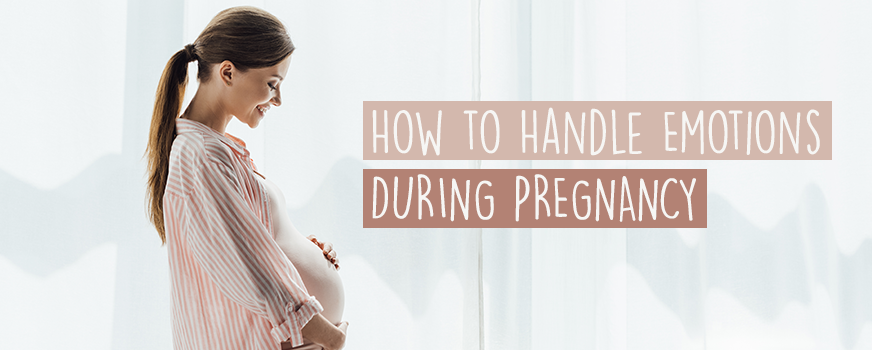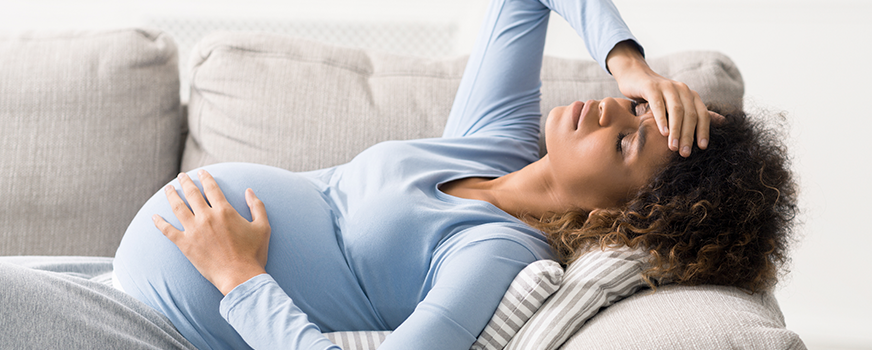
Hormone levels during pregnancy are all over the place, which leads to a common side effect for expecting mothers: mood swings. Read below to discover the science behind pregnancy mood swings and various ways to manage them.
What Causes Emotions During Pregnancy?
To put it simply: hormones. Your body is going through many changes during pregnancy and it can take a toll on your emotions. Estrogen and progesterone hormones are increasing, which can lead to an array of emotions and moods. Especially during your first trimester, expect to feel everything a little more intensely than you’re used to. According to the American Pregnancy Association notes that shifts in hormones can affect your neurotransmitters, which subsequently affect how your mood is regulated.
On top of what’s happening biologically, there are other factors that play into pregnancy mood swings. Your life is about to experience a big change, which can cause you to feel a range of emotions – from excitement for your new addition to anxiety about what the future holds. On top of that, changes to your social life, body image, and overall health may play into your emotions during pregnancy.

10 Common Pregnancy Emotions and Feelings
Anxiety
One of the most common emotions during pregnancy is anxiety. You probably have a lot running through your mind during this time, which can leave you feeling anxious. In fact, biologically, your anxiety and fear symptoms ramp up when pregnant. This is because your body is mentally preparing you to protect and care for your baby after birth.
Crankiness
Feeling cranky certainly isn’t a surprising feeling during pregnancy. It is easy to get frustrated when your body is going through so many changes physically and mentally. Things like lack of sleep and a surge of hormones can make it so that things that didn’t annoy you before pregnancy easily set you off during.
Fear
Similar to feeling anxious, you may feel fearful during pregnancy. It is very natural to have a fear of the unknown, even if this isn’t your first child. Again, this is your body naturally preparing you for parenthood, ensuring you to think through situations and have a plan in place to provide the ultimate care and support for your baby.
Forgetfulness
Hormones during pregnancy may cause you to experience what some call pregnancy brain. While your brain isn’t actually changing, everything you are going through can make it easy to become forgetful. An influx of hormones affects your brain circuits, as your focus is switching into parent-mode instead of find-your-keys mode.
Happiness
Of course happiness is one of the biggest emotions during pregnancy! You are about to welcome a new life into the world. Happiness and excitement only grow stronger as you get closer to finally holding your baby after months of getting to know them in the womb. Having happy moments with your baby before birth allow you to bond even closer.

Nesting
Typically in your third trimester, you will begin to feel a strong urge to nest – or prepare for your baby’s arrival. Usually this means feeling the need to clean, organize, build, pack, shop, or do whatever is necessary to ensure your baby comes into a readied home. The nesting phase of pregnancy is great, but try to avoid straining yourself.
Sadness
You are not alone in feeling sad during your pregnancy. Being pregnant changes a lot of things, from how you look and feel to your social life, which can leave you feeling down about a shift away from what you’re used to. If your sadness seems to be more severe than just a temporary feeling, speak with your doctor about depression during pregnancy.
Self-Consciousness
Often, bodies change slowly and gradually over time. During pregnancy, changes to your body happen rapidly, which can be jarring for some. These rapid changes may make you feel like a stranger in your new body or leave you feeling self-conscious about how you look. Your body is doing an amazing thing, and your body is beautiful no matter what!
Stress
Anxiety, fear, and stress are all similar emotions during pregnancy, but stress may be the most prevalent. Stress during pregnancy can come from stress about your health, scheduling appointments with your doctor, packing for the hospital, or preparing for your baby’s arrival. This is a busy time, so take a deep breath and take it one step at a time.
Tearfulness
Do you find yourself crying more than usual, whether it’s about a cute commercial or not having your favorite snack on hand? Hormones magnify your emotions during pregnancy and can trigger the floodgates. These crying spells don’t necessarily mean you’re sad; they can just be an indicator of a flood of emotions that can’t be held in.

How to Handle Pregnancy Mood Swings & Feelings
Communicate
The number-one way to manage your emotions during pregnancy is to talk about it. Be open with your partner, friends, family, doctor, or whomever you feel comfortable with during this time. When you communicate, you help those close to you understand how you are feeling and how they can help if needed. You are not alone during this time, and there are many people ready and happy to support you.
Make Time for Yourself
During pregnancy, it’s easy to get caught up in everything else and forget to take time for yourself. Giving yourself a break is important for keeping yourself feeling happy and healthy. Get a massage, read your favorite book, eat your favorite meal, or just dedicate 30 minutes of every day for taking a moment to slow down and breathe. If you push yourself too hard, you will only feel more and more exhausted. Give yourself (and your baby!) some time to decompress.
Speak with a Doctor
If you feel like learning how to handle emotions during pregnancy is too much for you, speak to your doctor to find a solution that works best for you. Your doctor is a great resource for navigating these new effects of hormones on your body. Be sure to be candid during your appointments, as your doctor can help identify anything that may be more urgent or severe than your common mood swings.
Pregnancy mood swings are very common and range between a wide number of emotions. You might be experiencing an emotional roller coaster, but the end emotion – the joy of meeting your baby – is more than worth it in the end! Being aware of your feelings helps keep you mentally and emotionally healthy, which is a benefit to both you and your baby.



